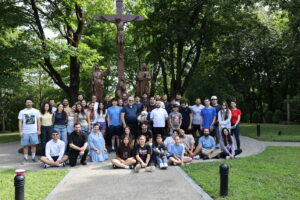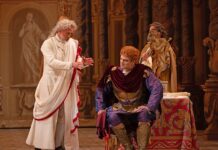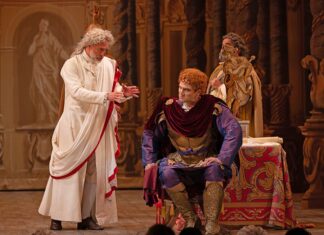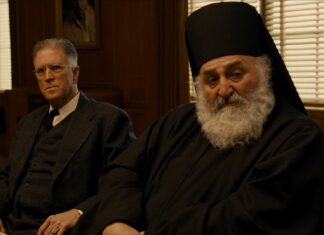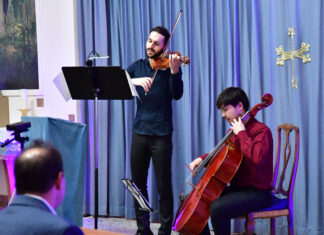BEREA, Ohio — Baldwin-Wallace College Composer-in-Residence Loris Ohannes Chobanian’s composition Avarayr — Fires of Zarathustra was premiered by the BW Symphonic Wind Ensemble conducted by Dwight Oltman, on January 22. A week later, the composition was performed at the Ohio Music Educator’s Conference in Cincinnati.
Chobanian’s composition refers to the Battle of Vartanantz and according to the program notes: Armenia became the first nation to adopt Christianity in 301 AD. Soon after, the Roman Emperor Constantine adopted Christianity as the dominant religion for the Roman Empire and in 313 he issued the Edict of Milan legalizing Christian worship.
As an aftermath of the Sassanid Persian conquests, Armenia was divided between the Byzantine and the Persian Empires. In the year 451 AD, the Sassanid King Yazdegerd II, an avid adherent of Ahura Mazda and the Zoroastrian religion, summoned the Armenian nobles and princes to his palace at Ctesiphon and ordered them to renounce their Christian faith and demanded that they give homage to the fires of the Ahura Mazda religion.
The Armenian nobles, led by Gen. Vartan Mamikonian, were made to face an unacceptable predicament. Considering the limited options they were offered, they decided to feign compliance with the Persian king’s wishes and proceeded to execute the ceremonial fire worshipping ritual.
King Yazdegerd II was very pleased. He rewarded the Armenian nobles and sent them back with the expectation that the Zoroastrian religion would be re- established in Armenia. However, soon after, he discovered that he had been deceived. The king was furious and sent an army of 300,000 together with a contingent of trained elephants in order to, once and for all, eradicate Christianity from Armenia. The Armenian army of 66,000 met the Persians at the valley of Avarayr on the Mount Ararat plateau. Both sides suffered extensive casualties, among them Vartan Mamikonian and most of his fellow warriors. The Persians won the battle but Christianity survived in Armenia.
The composition, Avarayr — Fires of Zarathustra, uses numerous descriptive sounds such as textures that depict explosive fires and themes that imply Persian musical motives. They do not, however, represent a succession of occurrences or order of events. The composition does not tell a story but it is inspired by the proposition that “Fanaticism in religion and politics can be malevolent and can lead to destructiveness.” The Zoroastrian concept of one God, heaven and hell must have influenced the major religions of Judaism, Christianity and Islam. Hymns ascribed to Zarathustra include invocations, rituals and spells against demons that were used at special occasions.
The form of the composition is set as variation for symphonic wind ensemble. Ritualistic themes introduced at the beginning, are constantly transformed and reappear in new guises. They are accompanied by diverse rhythmic patterns that are often used in the Middle East at ceremonial presentations. Contrasting themes clash and motives such as those of the Armenian Apostolic Church liturgy are superimposed at different intervals.
As a child the composer had visited the ruins of Ctesiphon many times. The theme of the composition became even more relevant to him when he discovered that he had actually been at the very location of the palace of king Yazdegerd II.
At the end of the academic year 2009-2010, after 40 years of teaching, Chobanian will retire in order to devote more time to composing. Several of his compositions are now on YouTube including Requiem April 24 for Chorus, Organ, Timpani and Chamber Ensemble performed at BW Conservatory to commemorate the Armenian Genocide. The Armenian text Tad’h Hayoon is from a collection of poems by Haigouhi Seropian and the singers learned the Armenian text phonetically.
Among the many scheduled Chobanian performances during April, the Cleveland Verb Ballet will present his Characters You Are Likely To Meet performed by Regina Mushabac, cello and choreographed by members of the ballet. The Cleveland Orchestra trombonist Massimo La Rosa will premiere Chobanian’s Celebration for Trombone and Piano. The Cleveland Flute Society will present Nocturne and Vivo for Flute and Guitar. Chobanian will conduct his composition, The Enchanted Forest for Flute Ensemble and Narration. BW Symphony Orchestra conducted by Dwight Oltman will premiere Chobanian’s Concerto for Piano Tuner and Orchestra with Robert Mayerovitch, piano.
Chobanian was instrumental in establishing the BW Conservatory Guitar and Composition programs as well as the BW Focus Contemporary Music Festival. He has taught at the Oberlin Conservatory and the University of Akron. An expert conductor, he often conducts his own compositions as guest composer with university, high school and professional orchestras. As a member of the Philosophical Club of Cleveland his most recent presentation was “Creativity and the Composer: Advice to Young Composers.”
Chobanian Premiers Fires Of Zarathustra
Top 5 Articles
- Trending
- Most Viewed
- Most Commented
- Thinking in Dark Times: The End of Tradition and the Crisis of Holocaust and Genocide Studies
- Holy Trinity Armenian Apostolic Church ‘Honoring Our Nonagenarian Members’
- Houshamadyan: Cuisine and Fried Omelets from Diyarbekir
- Recipe Corner: Elsie S. Donigian’s Potato Kufteh
- Haik Kazazyan Wins 2025 Classic Violin Olympus International Competition
- Why I Am Grateful to Erdogan, the Dictator of Turkey
- A Political Whirlwind Engulfs Nagorno Karabakh
- Libya’s Interim Government Recognizes the Armenian Genocide Once Again
- Robert Bedrosian Marries High Tech With Ancient Armenian Manuscripts
- Aleppo Aid through St. Kevork Armenian Apostolic Church of Houston
